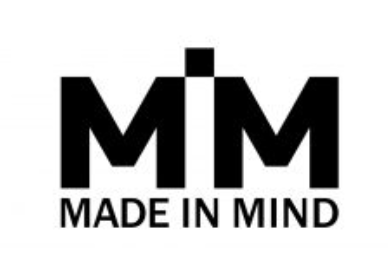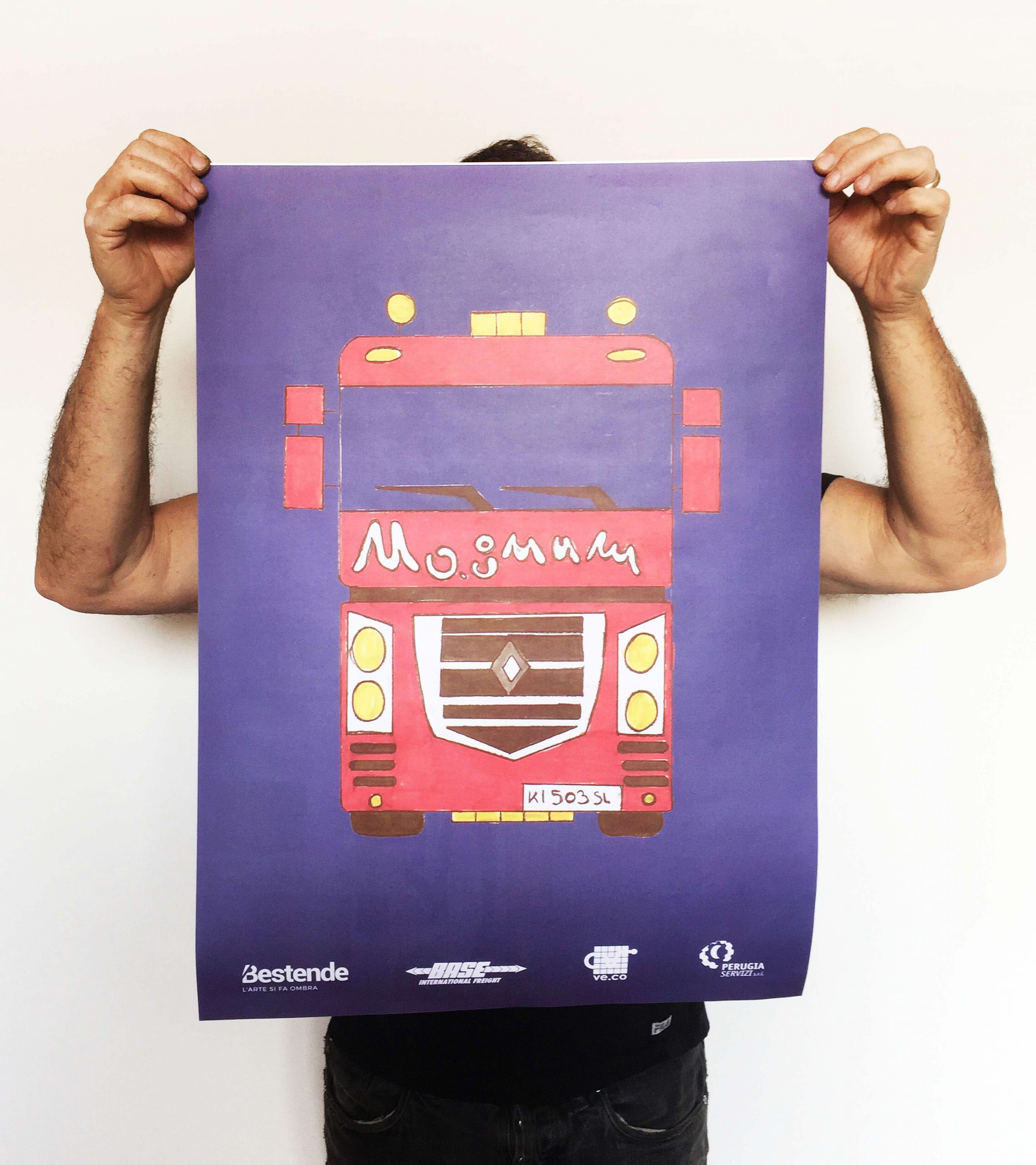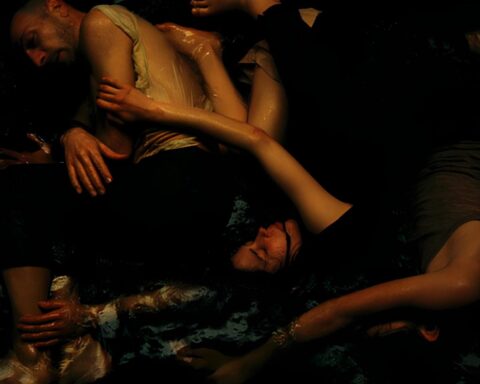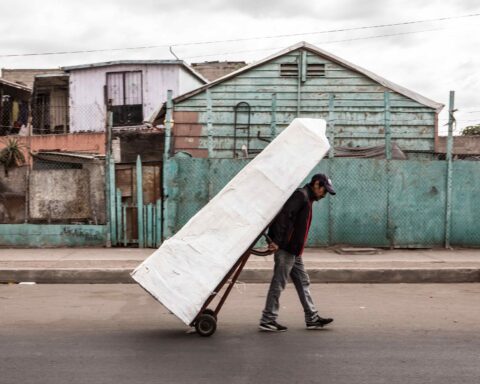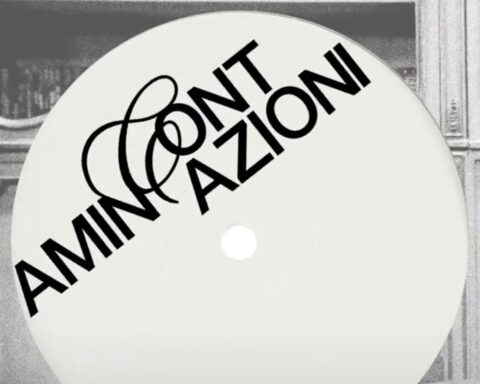Pink Emerald start and stop is not only the title you can read here but it’s also one of the narrative texts I wrote for the exhibit Cuore Selvaggio, the solo show of the italian artist Matteo Montagna that tries to define the trucker’s character, underlining his thoughts and behaviours. I could have written a sort of typical post-exhibition interview, asking Matteo: “What do you think about the protagonist? Is he the same way you have imagined in your mind and when you thought of the exhibit? Which meaning do you think the exhibition underlines?”, and so on. But reflecting on the content of Made in Mind magazine, together we decided to do something different.
A question came up: How does the story evolve in a sort of post-writing mediation phase? Does the artist recognize himself in the narration? How much does the narration tell about the exhibit? For this reason we decided to split the story into different paragraphs from the official printed version, shaping the content again and again into different formats, following different mediation’s and writing goals.
We thought Pink Emerald start and stop not only as a text to be published in the magazine, but as a more powerful and question-generating instrument – trying to revert our positions, attribute meanings and points of views – and maybe, doing so, discovering something hidden between the lines of the story/exhibition.
As follows, you can read the fragmented curatorial-narrative text as an imaginary dialogue between the artist Matteo Montagna and the curator Irene Sofia Comi. At the end of the conversation you will find a description of the exhibition Cuore Selvaggio and the artist biography.

Irene Sofia Comi: The asphalt is wet, it’s dark outside. Tiredness does not help to focus on the continuous line of the highway and Tommaso wonders when the devil will finally reach his goal.
Matteo Montagna: I recently discovered a phenomenon called road hypnosis. It’s a state of mind in which a person driving a vehicle responds correctly and safely to external information that he finds on his way, but the conscious part of his brain is focused elsewhere so as not to remember how he/she arrived at his/her destination. I imagine the life of a truck driver like that, flowing endlessly and grinding miles.
ISC: There’s no need to think about it, kilometers are all the same: one more or less won’t make any difference, there’s no way in getting lost in complicated thoughts. What the fuck does he care? It’s useless.
MM: Knowing the world of truck drivers, I don’t think they voluntarily get lost in complicated thoughts, but in one way or another driving for so many kilometers is like falling into limbo, being in a state of hypnosis. I imagine the conscious and unconscious state having a nice little chat in the head of a truck driver.
ISC: Bitches, better eating or jerking off, that if you distract yourself while driving you also risk to end up in the fast lane. You’ve already imagined the scene in your mind … Sbam! In an instant a beautiful accident and everything is gone. Last thing we need is that he loses his job. Immediately he sees the face of Giuseppina who, at the news of the dismissal, cries desperately, while heartening the little Matilde and Laura, protecting them under an abundant apron all packed with gravy. Oh, the girls. Tommaso hasn’t seen them for a while. On long journeys he always hopes that they are well, he sees their innocent smiles with the eyes of his heart. He misses them, his little girls.
MM: Yes, this is a classic image of the truck driver, but I would like to think for a moment about the word “jerk off”, and its thematic reflections. The sexual sphere is often associated with the world and culture of the truck driver. Based on my experience of contact with this world, for many truck drivers it is not easy to live with detachment from home and one’s affections. Many cheat on their wives with company secretaries to create remote love stories, some give in to temptation or to the beauty of a single fuck with a whore. The LGBT community organizes sexual encounters via Facebook groups in the truck stops, and someone stops at the parking area at night, even just for a blowjob. They too have their temptations and they too, like every human being, are fragile. It is well known that masturbating has a relaxing effect on the nervous system in situations of stress, anxiety or other moments of mental distress, so why – in the exhibition frame – don’t we take advantage to image to let it go, creating a parallel life to the ordinary one that we can find in our family nest. By the way, we are always looking for something that will eventually make us feel some more thrills.

ISC: And in this moment he’s unable to get out of his head the image of the driveway he sees when he finally returns home, and parks his Iveco.
MM: I would have preferred you to say Scania! ![]()
ISC: Being away from his family is not easy, yet Tommaso would never get off his truck. It is a lifestyle choice. He used to go crazy for trucks, since he was a kid.
MM: Everyone can do certain kinds of jobs, but it’s not easy to be a truck driver. It really becomes a lifestyle, it’s like being a bandit: you create another life when you spend time on the truck. These cabins are set up as if they were real miniature houses, there is a maniacal sense of order that leads them to be excellent housewives. Then small corners are recreated, dedicated to the family, to your partner, to the woman or man of your dreams. These environments are real sacred chapels for them.
ISC: They are beautiful outside, but when you go inside you discover a real paradise, a bit like it happens with women. He treats his cabin like a treasure: he polishes “her”, perfumes “her” and sucks every speck of dust. It’s a small secret world in which no one is allowed to enter, a sacred place with a holy card of Padre Pio on the dashboard.
MM: The concept of sacredness for a truck driver is very often important. It is a concept extended beyond the religious world. Venerating a woman of a calendar, her family, Padre Pio, is a bit like relying on fate by asking these figures to be protected or at least accompanied for the long journey that is about to be undertaken. A broader reference is to the world of navigation, where since ancient times the bow of the ship was decorated with figures of divinity, animals and later female figures with an apotropaic or obsequious concept. These small objects that we can find in a truck driver’s cabin are part of his rituality and identification.
ISC: From the truck cabin, he willingly comes down only if there is to go to eat at the Sports Bar: the portions are abundant and the cuisine is good. Everyone knows: where the truck drivers stop, the food is always good.
MM: This is pure truth. In every self-respecting truck driver’s restaurant, you go through the door and there are two sensations you feel. The affection of the mother who pampers you as if you were at home and the speed with which you are seated and served. As good mothers, the cooks and the staff have to make their son eat quickly so that he immediately returns to his duty as a driver.

ISC: There are also calendars of naked women outside the bathroom. What would he do at Manuela Arcuri, above his cabin. He certainly wouldn’t make her sleep, and the more he thinks about it, the more his blood throbs in his veins. But his favorite Pirelli calendar has always been that one of Anna Falchi, who is in the bathroom’s anteroom, close to the towel.
MM: Imagination accompanies truck drivers that gladly wallow in it, who could blame them? In the exhibition I displayed digital drawings built starting from the concept of “calendar woman”. These drawings show a playful and amusing woman, not the typical stereotypical woman on the calendar, but rather a woman told from a more childish and imaginative point of view. If my artistic research is inspired by the so-called popular culture, the figure of the woman on display in the drawings and sculptures is only one of the various facets that female representation assumes. Here the imagination is used as a childish exercise, of which the round and accentuated forms of the drawings and the sculptures are the result. Imagination is an abstraction process indispensable to knowledge, necessary in our life, even Calvino in his Six Memos For the Next Millennium spoke of the concept of imagination starting from the lesson on the concept of visibility. In this Coronavirus imprisonment, the visual contents are almost obsessive, the atmosphere is dystopic. The imagination is fully under fire in this society, continuously stimulated in an overflowing way by visual inputs, especially through new technologies. For children, however, the imagination is an instrument of knowledge, as in my research it is used in a reflective way towards the human being.
ISC: He knows it. He and The Sports Bar guys are very simple people, they are truck drivers. They like women as they are made, all women, but blondes have more sex. “Shit, one of these days I’ll tear out January and I’ll place it on the window.” He goes crazy with those women, and it is difficult to understand if it’s the tits, the asses or the curves that form the trucks attract him more.
MM: Who doesn’t like curves! The curves of a woman, the curves of a Porsche, the curves of an ass, the curves of the Monza racetrack, the curves of a simple arm, the curves that form a valley in the mountains. They are essential forms, an integral part of our daily lives.
ISC: Pink Emerald is the name of his conveyance, and it’s what makes him prouder. He loves the nickname made of led, on the cabin: the written part is pink, the frame is fluo green. You should see with what pride he goes straight on the A4 highway, when he feels he is the master of his big truck.
MM: The nickname is another small but very important detail of a truck driver’s rituality and identity. It is the possibility of creating an alter ego, of being able to live a parallel life, like a superhero. When you see on the opposite side of the roadway a truck arriving with its nickname it’s as if in a flash you could build the image of that truck driver. It is as if the embellishment of the vehicle is the right outfit for a “superhero” name.
ISC: He doesn’t notice, but he cums a lot. It’s that it all sounds crazy to him. He looks at the world from up there, and he feels like a King.
MM: I definitely love this phrase. It seems extracted from a text by Rino Gaetano and it could very well be a song dedicated – as Rino would say – to one of his popular characters, to the less wealthy classes of society. Being “the King” in life is sometimes necessary, both for what I have learned among truck drivers and for personal experience. Being “the King” is not to prevail over others, but to be proud and tenacious with your skills. Nobody gives anything.

MM: Ire, why have you decided to curate an exhibition dedicated to the world and to the trucker culture?
ISC: This final question surprised me: role switching! Unlike you, I don’t know this field due to close relations with it or from my childhood, and this has been one of the aspects that motivated my curiosity; after the first gaze, being able to enter a different world view and understand its dynamics and its reference behaviors, with a different depth; raising the awareness of possible worlds often considered less important in certain cultural environments. My research is aimed at what we could call an economy of presence and to the reality that surrounds us, with the intent of making us more aware of our gestures and automatisms (visual, behavioral or cultural). A second line of interest that prompted me to develop the project, and which correlates with the previous ones, is the visual pop culture derived from the world of truckers. It is a sort of subculture on which there’s no real literature, which creates a short circuit between art and life, creativity and society. In the exhibition, these elements conveyed through the image of communication, a frame of the film Over the top, and the fanzine created in collaboration with the graphic designer Adriano Nicolosi, a sort of crossmapping of cultural, mainstream, commercial phenomena and symbolism.
Matteo Montagna’s solo show Cuore Selvaggio has been curated by Irene Sofia Comi and hosted by Current, non-profit space in Milan from October 25 to December 14 in 2019.
Taking a cue from the truckers’ world, the exhibition proposes a fertile territory to reflect on the nature and the culture of a “truck driver”. This theme is usually dealt with in a condescending or in a caricatural way. On the contrary, Montagna deepens it with a curious and respectful attitude, especially reflecting on the role of the cover girls, a typical presence in all of the trucking industry’s environments (motorways, garages, inns). The artist decides to treat seriously a universe that is commonly considered known and familiar, but whose complexity is often ignored, as its richness of meanings. Artworks characterized by sexy aesthetics, bright colours and captivating shapes, propose a formal framework that refers to the clichés of a sort of machismo. But the cult of the feminine, which at first glance might appear vulgar and masculine, is reread by a boyish and malice-free gaze, as revealed by the curvaceous silhouettes, key stylistic elements of the project.
Entering the exhibit Cuore Selvaggio, the visitor participates in a micro-reality that turns out to be intimate and human, showing itself in its apparent, roaring simplicity. As if the cab of the truck was a sacred place, the truck driver’s life is made up of daily rituals that have become part of our common imagination. The artist proposes a personal reading of visual characteristics and linguistic codes, revealing a full-of-contrasts reality. Perhaps a little wild, but with a tender heart. The exhibition is accompanied by a fanzine that deals with the theme of the truckers’ visual culture, in a game of visual combinations between real elements, merchandising and contemporary drifts.
Matteo Montagna (Vimercate, 1992, lives and works in Milan) graduated in 2015 at NABA – Nuova Accademia di Belle Arti of Milan. Most recent solo and collective exhibitions include: Fruffrù, curated by Andrea Croce, BoCs Art a cura di Giacinto di Pietrantonio, Cosenza (2019); Overlap, curated by Andrea Croce and Michela Murialdo, Galleria Nazionale di Cosenza, Cosenza (2019); Cuore Selvaggio, solo show curated by Irene Sofia Comi, Current, Milan (2019); Cristallino, curated by Chiara Fusar Bassini and Federica Mutti, luogo_e, Bergamo (2019); Filling the absence, curated by Pinksummer Gallery, Genoa (2019); Brooom Broom, solo show curated by Sonnenstube and Morel, Lugano, CH (2017); Cali Gold Rush, curated by Marcello Maloberti and Lucie Fontaine, Milan (2014); One Remembers A Part Of What One Saw And Forgets The Rest, curated by Elvira Vannini, Careof, Milan (2013).

